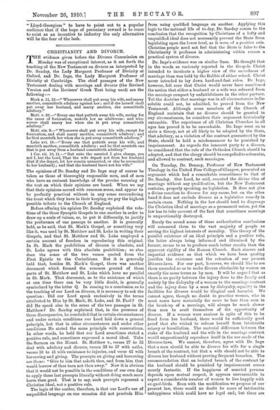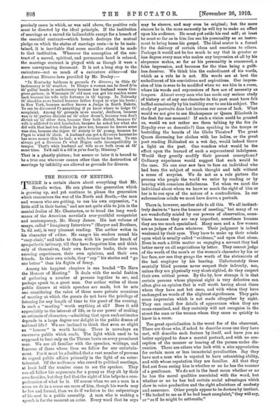CHRISTIANITY AND DIVORCE.
THE evidence given before the Divorce Commission on Monday was of exceptional interest, as it set forth the teaching of the New Testament on divorce as interpreted by Dr. Sanday, the Lady Margaret Professor of Divinity at Oxford, and Dr. Inge, the Lady Margaret Professor of Divinity at Cambridge. The chief passages of the New Testament dealing with marriage and divorce (the Revised Mark x. 11, 12.—" Whosoever shall put away his wife, and marry another, committeth adultery against her; and if she herself shall put away her husband, and marry another, she committeth adultery.'
Matt. v. 32.—"Every one that putteth away his wife, saving for the cause of fornication, maketh her an adulteress : and who- soever shall marry her when she is put away committeth adultery."
Matt. xix. 9.—" Whosoever shall put away his wife, except for fornication, and shall marry another, committeth adultery: and he that marrieth her when she is put away committeth adultery."
Luke xvi. 18.—" Every one that putteth away his wife, and marrieth another, committeth adultery: and he that marrieth one that is put away from a husband committeth adultery."
- 1 Cor. vii. 10, 11.—" But unto the married I give charge, yea not I, but the Lord, That the wife depart not from her husband (but if she depart, let her remain unmarried, or else be reconciled to her husband) ; and that the husband leave not his wife."
The opinions of Dr. Sanday and Dr. Inge may of course be taken as those of thoroughly responsible men, and of men who have an eminent knowledge of the precise meaning of the text on which their opinions are based. When we say that their opinions accord with common-sense, and appear to be perfectly practical without in any sense surrendering the trust which they have in their keeping, we pay the highest possible tribute to the Church of England.
Before offering his opinion Dr. Sanday explained the rela- tions of the three Synoptic Gospels to one another in order to draw up a scale of values, or, to put it differently, to justify the preference of one passage to another. It is generally held, as he said, that St. Mark's Gospel, or something very like it, was used by St. Matthew and St. Luke in writing their Gospels, and that St. Matthew and St. Luke employed a certain amount of freedom in reproducing this originaL In St. Mark the prohibition of divorce is absolute, and St. Luke agrees with this absolute prohibition ; so also does the sense of the two verses quoted from the First Epistle to the Corinthians. But it is generally held that, besides St. Mark's Gospel, there was another document which formed the common ground of those parts of St. Matthew and St. Luke which have no parallel in St. Mark. That document, as to the existence of which at one time there can be very little doubt, is generally symbolised by the letter Q. In coming to a conclusion as to the teaching of our Lord on divorce, it is necessary to ask the question : Did our Lord speak exclusively in the terms attributed to Him by St. Mark, St. Luke, and St. Paul ? Or did He speak also in the sense of the two passages in St. Matthew ? Dr. Sanday explained that in the presence of these discrepancies, he concluded that in certain circumstances and under certain conditions our Lord laid down a general principle, but that in other circumstances and under other conditions He stated the same principle with reservations. In other words, he held that our Lord sometimes stated a positive rule, and sometimes expressed a moral ideal. Take the Sermon on the Mount. St. Matthew v., verses 27 to 32 deal with adultery and divorce, verses 33 to 37 with oaths, verses 38 to 41 with resistance to injuries, and verse 42 with borrowing and giving. The precepts on giving and borrowing are these: "Give to him that asketh thee, and from him that would borrow of thee turn not thou away." Now it is obvious that it would not be possible in the conditions of our own day to apply these last precepts literally without doing much more harm than good. That is to say, such precepts represent a Christian ideal, not a positive rule.
The logic of the matter, therefore, is that our Lord's use of unqualified language on one occasion did not preclude Him
from using qualified language on another. Applying this logic to the national life of to-day, Dr. Sanday comes to the conclusion that the recognition by Christians of a lofty and unqualified ideal does not necessarily prevent the State from legislating upon the lower level, as it were, of a positive rule. Christian people need not feel that the State is false to the Christianity it professes in administering within reason a practical system of divorce.
Dr. Inge's evidence was on similar lines. He thought that in the words so variously reported in the Gospels Christ intended to inculcate a higher view of the sacredness of marriage than was held by the Rabbis of either school. Christ never intended to lay down hard-and-fast rules. Dr. Inge, however, felt sure that Christ would never have sanctioned the notion that either a husband or a wife was released from the marriage compact by unfaithfulness in the other partner. Yet the doctrine that marriage was in all circumstances indis- soluble could not, he admitted, be proved from the New Testament. Although some members of the Church of England maintain that no divorce should be granted in any circumstances, he considers their argument historically untenable. The experience of all Christian Churches in all ages has proved it to be unworkable. Dr. Inge went on to state a theory, not at all likely to be adopted by the State, that adultery, as a violation of the contract guaranteed by the State, should be held a misdemeanour to be punished by imprisonment. As regards the innocent party to a divorce, he considered that the rule of the Orthodox Church should be adopted, and that the clergy should be compelled to solemnise, and allowed to contract, such marriages.
On Tuesday, Dr. Denney, Professor of New Testament Theology in the United Free College of Glasgow, presented an argument which had a remarkable resemblance to that of Dr. Sanday. Our Lord, he said, asserted the divine idea of marriage without any qualification, but the New Testament contains, properly speaking, no legislation. It does not give a divine sanction to divorce for any cause, but on the other hand it does not exclude divorce as a legislative remedy in certain cases. Nothing in the law should tend to disparage the Christian ideal of marriage as a permanent union, yet the law has to take account of the fact that sometimes marriage is unquestionably destroyed.
Surely the sound sense of these authoritative conclusions will commend them to the vast majority of people as serving the highest interests of morality. This theory of the parallel existence of an ideal principle and a positive rule, the latter always being informed and illumined by the former, seems to us to produce much better results than the apparent rigidity of the Roman Church. Such sincere and impartial evidence as that which we have been quoting justifies the existence and the retention of our present Divorce-laws. For our part, however, we should like to see them amended so as to make divorce obtainable by women on exactly the same terms as by men. It will be argued that as there is no parity between the injury done to the family and society by the disloyalty of a woman to the marriage contract and the injury done by a man by disloyalty, equality in the facilities for divorce would be illogical and harmful. We cannot agree, though no doubt in practice women, who in most cases have materially far more to lose than men in the break-up of a marriage, will always be much slower than men to avail themselves of the opportunity of divorce. If a woman were anxious in spite of this to be freed from her husband, there would be sufficiently good proof that she wished to release herself from intolerable misery or humiliation. The material difference bct-.veen the stake of the husband and the wife in the marriage contract would unquestionably reproduce itself in the use made of the Divorce-laws. We cannot, therefore, agree with Dr. Inge that a man should be able to divorce his wife for a single breach of the contract, but that a wife should not be able to divorce her husband without proving frequent breaches. The recommendation that an isolated breach of the contract by the husband should be punished by imprisonment seems merely fantastic. If the happiness of married persons depends upon mutual respect, it appears unreasonable to expect a considerable number of women to live happily with ex-gaol-birds. Even with the modification we propose of our present law, there would no doubt be cases of intolerable unhappiness which could have no legal end; but these are
precisely cases in which, as was said above, the positive rule must be directed by the ideal principle. If the institution of marriage as a sacred tie indissoluble except for a breach of the essential contract—which breach destroys the mutual pledge on which the status of marriage rests—is to be main- tained, it is inevitable that some sacrifice should be made to that institution. Wherever the conception of the con- tract of a sacred, spiritual, and permanent bond is relaxed, the marriage contract is played with as though it were a mere conveyancing document. It is not a long step to the caricature—not so much of a caricature either—of the American Divorce-laws provided by Mr. Dooley :—
In Kentucky baldness is grounds fr divorce ; in Ohio th' Inclemency iv th' weather. In Illinye a woman can be freed fr'm th' gallin' bonds iv mathrimony because her husband wears Con- gress gaiters; in Wisconsin th' old man can get his maiden name back because his wife tells fortunes in th' taycup. In Nebrasky th' shackles ar-re busted because father forgot to wipe his boots ; in New York, because mother knows a Judge in South Dakota. Ye can be divoorced f'r annything if ye know where to lodge th' complaint. Among th' grounds ar-re snorin', deefness, because wan iv th' parties dhrinks an' th' other doesn't, because wan don't dhrink an' th' other does, because they both dhrink, because th' wife is addicted to sick headaches, because he asked her what she did with that last ten dollars he gave her, because he knows some wan else, because she injyes th' society iv th' young, because he frgot to wind th' clock. A husband can get a divoorce because he has more money thin he had; a wife, because he has less. Ye can always get a divoorce Pr what Hogan calls incompatibility iv temper. That's whin husband an' wife ar-re both cross at th' same time. Ye'd call it a tiff in ye'er famly, Hinnissy."
That is a ghastly picture ; but sooner or later it is bound to be a true one wherever causes other than the destruction of marriage by infidelity are allowed as grounds for divorce.



















































 Previous page
Previous page